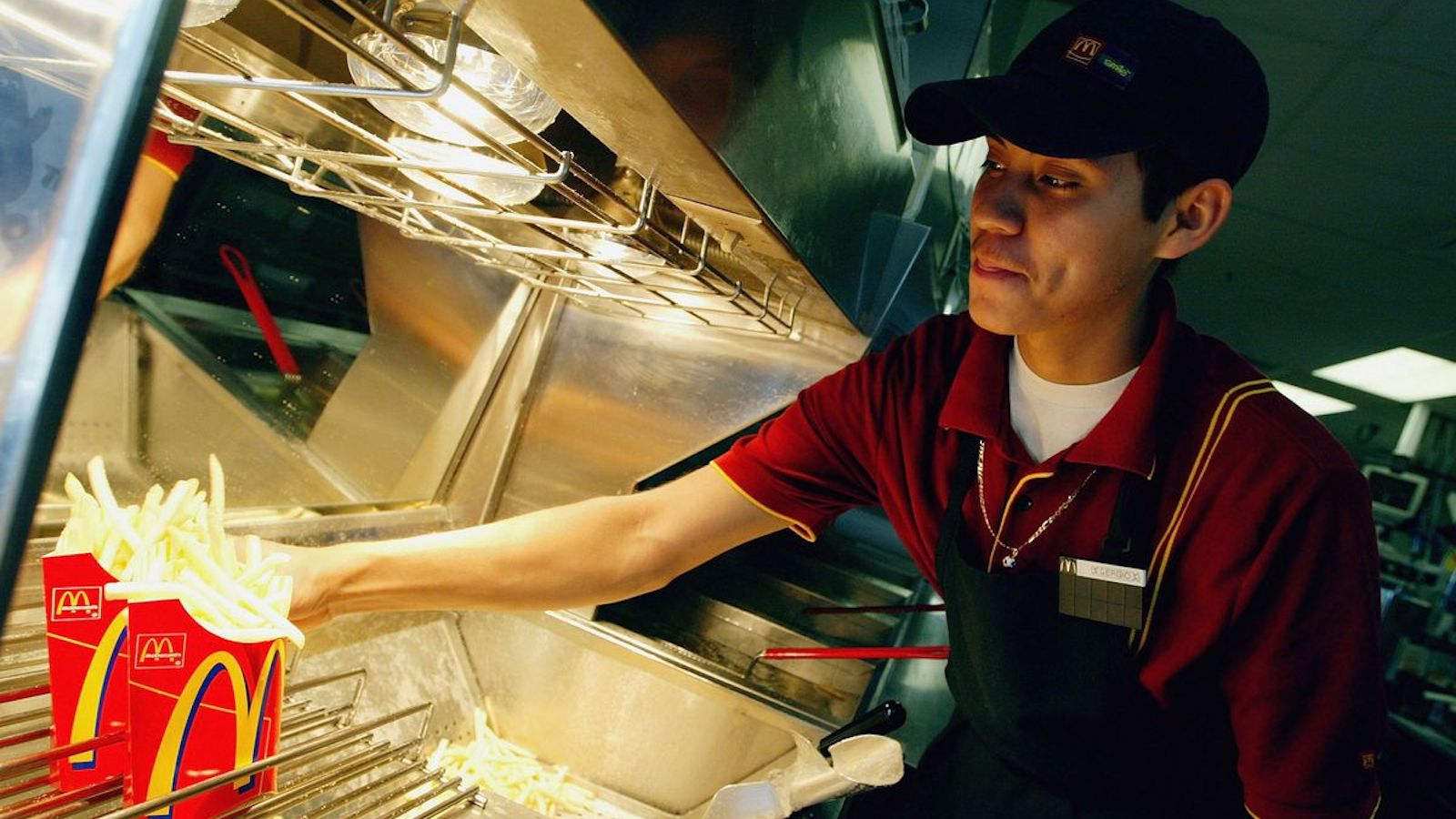
Actually, Fast Food Jobs are Good
It’s not every day I take exception to America’s best columnist. Nor is it often I have a bone of contention with acerbic commentator Kevin Williamson, other than his obscenely callous contention that rooted ruralites deserve to die out. But, alas, here I am, channeling Walter Block in defending the most undefendable of jobs: fast food preparation and service.
That the country experienced an intercurrent pandemic of shorthandedness over the summer is not news. Outsized labor tightness has dominated news headlines for months. There are over 10 million open jobs countrywide—a new benchmark. If you took to America’s highways and byways these past sweltering months, you’ve no doubt encountered a sign or two taped to the front door of local beaneries with text either prevailing the public for applicants, asking for grace paid to understaffed staff, or both.
Matthew Walther and Williamson, a dirigisme advocate and proud capitalist respectively, have only this to say with struggling franchise owners: hard cheese! “If only there were some time-tested strategy for attracting new workers, one that is supported by standard economic theory and that has proven itself effective in many different industries over centuries!” Williamson pronounces. He is, of course, referring to the strategy President Biden put in blunt terms: “pay them more.”
How easy! How simple! How deceptively ingenious that only a tightwad, payroll scouring Scrooge would ever deny the sheer brilliance of upping the starter wage! Forget the Böhm-Bawerk; forget the Kirzner; just type a few integers into Gusto and gusto! Instant applicants!
Never mind the feds cashing out an annual salary of $44,000 to the unemployed to simply sit on their bummy. “Pay people more” is a rhetorical dodge for anyone without a glancing familiarity of fiscal management. Any bump in wages, whether for the beginners or experienced, is compounded and calculated right off the bat to account for yearly profit margin. And most small businesses, franchises of megacorps included, operate on slim margins. A seemingly minute alteration of a dime-jump in starting pay can turn black to red. Expenses can’t easily be hung.
But the Walther/Williamson tirade against expendable wages goes deeper than mere P&L. The assault is aimed at the ontology of emptying fry baskets. Walther asks: “[W]hy should he,” the “he” being the shiftless dole-rider, “accept a pittance for mind-numbing work, no benefits, and virtually no prospect of advancement?”
Impressive: each item in that comma-ed series is wrong. Anyone who’s ever worked the weekend lunch rush at Burger King can attest that, at no point, was the furious preparation and pass off of a hundred Whoppers “mind-numbing.” Whining that Ronald McDonald won’t cover your Blue Shield plan is also an outdated gripe: most fast food eateries now offer health insurance to the lowliest clerk after a trial period. And no prospect for advancement? Talk to any Taco Bell owner about his or her need for competent managers. Any gordita stuffer who displays even the slightest tidbit of motivation is immediately tasked with more responsibility and potential to jump station. For your sheer ignorance of the inner-workings of fast foodery, Mr. Walther, I award you no econ-exam points, and may God have mercy on your soul.
To be fair, Walther’s critique is more aesthetic than economic. He writes, “$19,000 a year is not reasonable compensation for ensuring that the rest of us can eat mechanically separated meat at whatever hour of the day we choose.” When phrased like that, no, that may not sound desirable if your ideal society is merchants and husbandmen with potatoey wives and ample, squawking broods living in timber shanties that bound a central church spire. But a daily crush of migrants at the U.S. southern border suggests that earning more money a year than a villa in San Salvador collects in taxes in a decade is, in fact, desirable. Not to Fortnite-addicted teens who coast through public high school with As because testing standards are now racist. But maybe it is for a young man used to eating nixtamalized tortillas for dinner eight days a week.
Williamson is understandably worried that paltry pay and hardass bosses turn every minimum-wage Mikey into little Karl Marxes. After excoriating chief-exec Andy Wiederhorn for being worth $100 million and complaining that two burger joints he oversees, Johnny Rockets and Fatburger, can’t attract enough staff, Williamson warns, “[t]his is the doofus who is complaining that it is hard to find a reliable fry-guy—you want to know why your kids love Bernie Sanders? This is why your kids love Bernie Sanders.”
Yes, and no. Unkind, imperious bosses don’t give capitalism a good name. But they’re part of life’s territory: not everyone you meet and talk to in life will be a breezy, sunshiny day. Only the “privileged young,” as Anthony Daniels observes, “mistake the dissatisfactions of their existence for the rottenness or depravity of the world.” Williamson owes them no excuses.
The hellish picture Walther and Williamson paint of low-skilled scut work is far removed from the reality of cheap-eats kitchens.
I worked in food service for over half a decade, in both high school and college. My starting wage was $5.85 in 2003, which was at or around minimum wage. The experience was everything: frustrating, fun, friendship-creating, enemy-making, love-blooming, a crucible of heartbreak, maddeningly busy, languidly slow, educative, destructive, confidence-boosting, spirit-sapping, enlivening, deadening. I started out managed by high schoolers not much older than me; I ended managing high schoolers younger than me.
Was I exploited to sell overpriced, red-grease-dripping tacos to amusement park goers? Maybe, but not as much as the children of yesteryear who put in 14-hour days at the textile plant before their tenth birthday or the five-year-olds who rose at dawn to harvest entire fields of corn on the family farm. Economic exploitation is a matter of perspective: putting in half a day of toad work behind the Wendy’s counter, in an electricity-lit, temp-controlled prep station, is hardly life-threatening, and not all that laborious. Tedium isn’t fun—that’s why it pays.
Let’s be real: few if any people are served by Walther and Williamson’s profession, i.e. online writing. It’s an exercise in ego-stroking and *inserts dense polysyllabic word to fool the reader into thinking I’m smarter, brighter, and more well-read than I actually am*. A Newport-chimney, rheumatic single mother of six serving one quarter-pounder value meal to a working stiff on his lunch hour is a more virtuous and productive act than typing one consonant into the digitsphere.
The contempt keyboard knights have for the jobber and his spatula betrays an insecurity: that internet babble is nothing—tangibly, physically, corporeally nothing—compared to real handiwork. So many of the “higher” professions, including writing, lecturing, thinking, and general intellectual preening, wouldn’t be possible without someone, somewhere thanklessly manning a cash register. And that’s humiliating for those whose hands have never so much as folded a napkin.
Fast food jobs are just another setting for all of life’s multifarious social interactions. They aren’t the fabled Satanic Mills. Like everything else, low-remunerative moiling is what you make of it. Work can be a great dispenser of virtue and ethic, or it can be immiserating. The choice is the worker’s, not the internet ink spiller observing from afar.
Free the People publishes opinion-based articles from contributing writers. The opinions and ideas expressed do not always reflect the opinions and ideas that Free the People endorses. We believe in free speech, and in providing a platform for open dialogue. Feel free to leave a comment.



